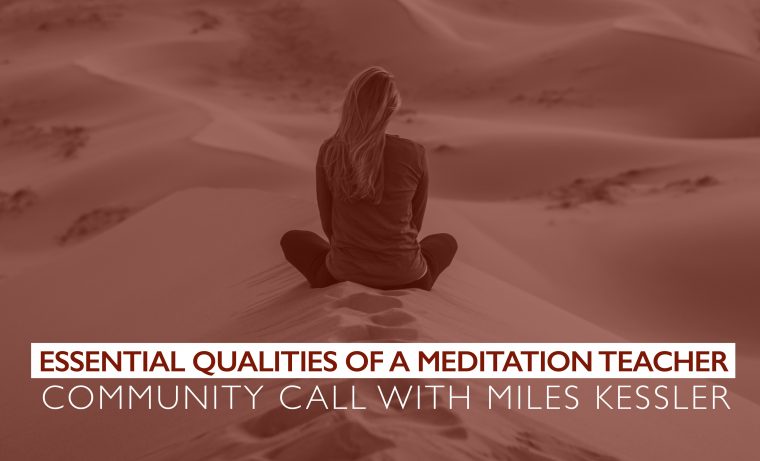In the Buddhist tradition, a meditation teacher is called a “kalyana-mitta”, which means a “noble friend”, or a “spiritual companion.” They are men or women who have already walked the path and can in turn accompany you along your own journey. But are the qualities that make someone a meditation teacher or spiritual guide? I recently explored this question in a Community Call on the essential qualities of a meditation teacher, and how they relate to you.

Essential Qualities Of A Meditation Teacher
Having a formal meditation teacher is significant because of the transformational potential of the spiritual path. Because of the karmic impact of such a relationship, it is important that a meditation teacher has matured to the degree of possessing certain inner qualities. And anyone who may be aspiring to become a meditation teacher should cultivate and continue to strengthen these qualities.
Recently I held a Community Call on the Buddha’s teaching of “Essential Qualities Of A Meditation Teacher.” This is the classic teaching on the “kalyana-mitta” and it covers the 5 essential qualities as taught by the Buddha. However, it must be said that this list is not exhaustive. Like many of the participants in the community call, you too can probably think of some important qualities you would add to this list.
Yet this list of the 5 essential qualities of a meditation teacher is a beautiful reflection of a purified and awakened mind. These qualities are the very fruit of a mature spiritual practice.
Here are the 5 essential qualities plus some of the points that I explored in this Community Call:
- How a meditation teacher is different than other types of teachers
- The teacher/student relationship and the “developmental zone”
- The 5 qualities of a meditation teacher
-
- They are lovable.
- They are worthy of your love (morally and ethically).
- They are deeply experienced in both theory and practice.
- They can communicate that which is difficult to communicate (complex perspectives as well as the hard truth).
- They teach only for the benefit of the student, and not for their own gain.
Finally, I finish the community call with a discussion on how do these 5 essential qualities relate to your own potential.
For anyone who is practicing meditation with a teacher, and especially if you aspire to teach meditation yourself, then I think you will gain an important orientation from this Community Call replay.
Check out the replay below:
Question: What qualities do you see as important in a meditation teacher? Join the conversation by adding a question or comment below!
Here is the “chat log” from this Community Call on “The Essential Qualities Of A Meditation Teacher”
00:34:14 Moritz Gorny: Being humble
00:34:30 Renate Kavuza: faithfulness
00:34:36 Ozlem Dinckal: Equanimous
00:34:39 Steve Rockett: patience, tolerance, ethical, challenging,
00:34:55 Renate Kavuza: integrity
00:34:58 Kherry: Deep listener
00:35:01 Annette: willing to work through own stuff again and again
00:35:02 pierrot hans: present open
00:35:12 pierrot hans: infinite listening
00:35:28 Mark Hurwit: The teacher has to recognize the fine line(s) between effecting and just allowing (or recognizing) the truth of the situation… and knowing how to usher a person through his or her conditioning (mostly unconscious)
00:35:47 Thorsten Arnold: Humour
00:35:54 Moritz Gorny: Benevolence
00:35:57 Mark Hurwit: efforting
00:35:58 Ayelet Savilla: being able to differentiate
00:36:05 Mandy Barber: Empathetic
00:36:30 hal Michaels: One’s practice is and developed enough awareness of the path to knowing when to teach
00:36:37 Mark Hurwit: typo: efforting, not effecting
00:36:40 judithrobinson: truthful
00:36:45 Ayelet Savilla: also differentiate ones way of Progress and the one of the student
00:37:04 Carl T: new perspectives
00:37:13 Thorsten Arnold: Being a learner
00:39:23 Steve Rockett: is loveable the same as charisma?
00:44:16 Ozlem Dinckal: Right speech
00:44:22 Ozlem Dinckal: Right livelihood
00:44:45 Mark Hurwit: honor your parents?
00:45:03 judithrobinson: keep mind clear
00:45:04 Ayelet Savilla: live what <ou teach/preach
00:50:15 Mark Hurwit: like holding up a flower to say… it all.
00:50:46 Ozlem Dinckal: S.N. Goenka used to tell a lot of stories
00:51:37 Steve Rockett: are parables good ways to communicate?
00:51:41 Hal Michaels: yes
00:52:22 Mark Hurwit: Ann?
00:52:32 Kherry: Annie Sullivan
00:55:51 Mark Hurwit: pointing at the moon…
00:55:59 pierrot hans: what you don’t want to hear
00:56:04 Hal Michaels: The word and feeling =
00:56:17 Renate Kavuza: what a Student does not want to hear
00:56:35 Cristina Soto-Weibel: I Nahuatl a teacher is one that holds a mirror to your face
00:59:24 Susanne Ines Kosch: but a monk may want to feel important…
01:02:04 Mark Hurwit: 1. is lovable / 2. is worth of that love / 3. knowledgeable in practice in theory / 4. can communicate that which is hard to receive / 5. teaches only for the benefit of the student (or the whole
01:02:08 Renate Kavuza: I can’t really believe in the 5. quality
01:02:16 Hal Michaels: Where does Lovable originate from
01:02:35 Mark Hurwit: even in aikido
01:02:55 Renate Kavuza: there is always a Benefit for the teacher and they know it
01:04:08 Ayelet Savilla: qualities 2 to 5 i can work on, but quality 1 ?
01:05:10 Susanne Ines Kosch: one I feel is like a lightful joyful radiance….
01:05:43 Renate Kavuza: eliciting some fascination
01:07:17 Cassandra Dragonrose Graey: I feel like one is like…a spoonful of sugar. Like the way they are is just palatable to the student(s), maybe?
01:09:23 Cassandra Dragonrose Graey: maybe not. I don’t know if I can believe that 1 is just charisma
01:09:52 Mark Hurwit: maybe part of our progression into (and beyond) our self is to develop the confidence to discern between our own ability to recognize our truth when it contrasts with something we considered questionable in a teacher
01:10:04 Susanne Ines Kosch: umm, I wanted to say that st benedict wrote in his rule that the abbot of the community, first of all, needs to be aware of his own difficulties and limitations
01:10:48 Cassandra Dragonrose Graey: Something that sticks with me a lot as a student is, “never abdicate your own authority”.
01:11:06 sumaya: Thanks miles for all the sharing, was very interesting. I have to go now. Greetings Sumaya
01:11:33 Hal Michaels: When is the right time to teach eg most paths now have teacher programs from the start
01:12:17 Cassandra Dragonrose Graey: I love that. “it’s not surrendering to the teacher – it’s surrendering to yourself.”
01:16:07 Richard Sims: Great call, always enjoy the teachings and conversation. Gotta run to a prior responsibility. Be well everyone, hope to be with you again soon. Take care!
01:17:29 Renate Kavuza: a teacher in a good lineage is as if you get his teacher.
01:17:47 Renate Kavuza: ins’t he?
01:18:35 pierrot hans: the best teacher is the one I can learn from
01:18:36 Thorsten Arnold: Can you teach without being a teacher? As a student who lives in a rural area, I taught to continue teaching – and made clear I was really just a student. Myself, teaching I learned more rapidly than under even high-ranking teachers. My students learned faster than with many high-ranking teachers.
01:19:37 Renate Kavuza: sure
01:20:45 Thorsten Arnold: (don’t find the “Raise Hand” button on my screen)
01:21:07 Mark Hurwit: look under the participants’ list
01:21:17 Moritz Gorny: Go to “Participants” (Teilnehmer) there will be a blue hand
01:21:33 Renate Kavuza: at the bottom
01:23:51 Annette: Thank You Cristina for pointing out the special difficulty of a woman on the path
01:23:59 Mark Hurwit: yes, thank you.
01:24:46 Mark Hurwit: It creates a long-lived fear… then mistrusting everyone and everything.
01:25:12 Ayelet Savilla: so women have to support each other and don’t wait for others to solve it for them. its also about self-responsibility.
01:25:48 Mark Hurwit: trauma has a similar effect on everyone (not just women)
01:26:02 Adri Cunha: would the term “lovable” be corresponding to “metta”? would it be the same root?
01:28:26 Cassandra Dragonrose Graey: very similar for other marginalized communities, e.g. BIPOC and being queer
01:28:37 Steve Rockett: Abuse comes in many forms. It can be mockery, politics, bigotry, misogynism, withholding promotions, making the other the butt of jokes, physically hurting, without restraint, etc.
01:28:51 Mark Hurwit: indeed
01:30:26 Hal Michaels: Shibu Cho
01:30:53 Hal Michaels: A person who heads the teaching of the main teacher a far away
01:32:44 Mandy Barber: Enormous responsibility to your students and yourself as a teacher.
01:33:12 Hal Michaels: In Koyru you not called a Sensei till 6th Dan
01:46:07 Renate Kavuza: yeah
01:49:36 Renate Kavuza: but what, if it is the teacher’s experience and enlightenment?
01:49:40 Cassandra Dragonrose Graey: that was beautiful






Please note: I reserve the right to delete comments that are offensive or off-topic.